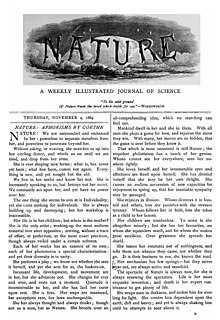
In academic publishing, a scientific journal is a periodical publication intended to further the progress of science, usually by reporting new research.

The London School of Economics is a public research university located in London, England, and a member institution of the federal University of London. Founded in 1895, by Fabian Society members Sidney Webb, Beatrice Webb, Graham Wallas, and George Bernard Shaw, LSE joined the University of London in 1900 and established its first degree courses under the auspices of the university in 1901. LSE began awarding its own degrees in its own name in 2008, prior to which it awarded degrees of the University of London.

The University of Kent is a semi-collegiate public research university based in Kent, United Kingdom. The University was granted its Royal Charter on 4 January 1965 and the following year Princess Marina, Duchess of Kent was formally installed as the first Chancellor.

Academic publishing is the subfield of publishing which distributes academic research and scholarship. Most academic work is published in academic journal articles, books or thesis' form. The part of academic written output that is not formally published but merely printed up or posted on the Internet is often called "grey literature". Most scientific and scholarly journals, and many academic and scholarly books, though not all, are based on some form of peer review or editorial refereeing to qualify texts for publication. Peer review quality and selectivity standards vary greatly from journal to journal, publisher to publisher, and field to field.
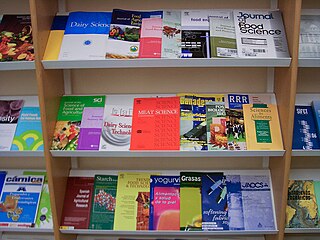
An academic or scholarly journal is a periodical publication in which scholarship relating to a particular academic discipline is published. Academic journals serve as permanent and transparent forums for the presentation, scrutiny, and discussion of research. They are usually peer-reviewed or refereed. Content typically takes the form of articles presenting original research, review articles, and book reviews. The purpose of an academic journal, according to Henry Oldenburg, is to give researchers a venue to "impart their knowledge to one another, and contribute what they can to the Grand design of improving natural knowledge, and perfecting all Philosophical Arts, and Sciences."

Elsevier is a Netherlands-based information and analytics company specializing in scientific, technical, and medical content. It is a part of the RELX Group, known until 2015 as Reed Elsevier. Its products include journals such as The Lancet and Cell, the ScienceDirect collection of electronic journals, the Trends and Current Opinion series of journals, the online citation database Scopus, SciVal, a tool that measures research performance, the ClinicalKey search engine for clinicians, and ClinicalPath evidence-based cancer care service. Elsevier's products also include digital tools for data management, instruction, and assessment.

Sir Clive William John Granger was a British econometrician known for his contributions to non-linear time series. He taught in Britain, at the University of Nottingham and in the United States, at the University of California, San Diego. During his university he was a member of Claymore. Granger was awarded the Nobel Memorial Prize in Economic Sciences in 2003 in recognition of the contributions that he and his co-winner, Robert F. Engle, had made to the analysis of time series data. This work fundamentally changed the way in which economists analyse financial and macroeconomic data.
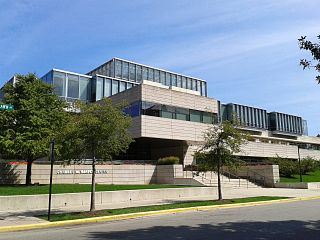
The University of Chicago Booth School of Business is the graduate business school of the University of Chicago. Founded in 1898, Chicago Booth is the second-oldest business school in the U.S. and is associated with 9 Nobel laureates in the Economic Sciences, more than any other business school in the world. The school has the third-largest endowment of any business school. Chicago Booth's MBA program is ranked No. 3 in the U.S. by U.S. News & World Report, No. 1 in the U.S by Forbes, and No. 1 globally by The Economist.

The Academic Ranking of World Universities (ARWU), also known as the Shanghai Ranking, is one of the annual publications of world university rankings. The league table was originally compiled and issued by Shanghai Jiao Tong University in 2003, making it the first global university ranking with multifarious indicators.
The Institute for Scientific Information (ISI) was an academic publishing service, founded by Eugene Garfield in Philadelphia in 1956. ISI offered scientometric and bibliographic database services. Its specialty was citation indexing and analysis, a field pioneered by Garfield.

The Open University of Catalonia is a private open university based in Barcelona, Spain.
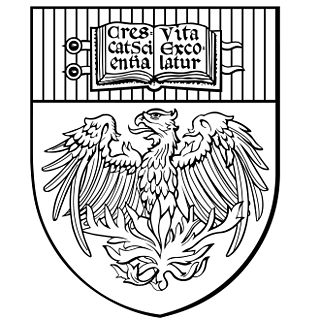
The University of Chicago Press is the largest and one of the oldest university presses in the United States. It is operated by the University of Chicago and publishes a wide variety of academic titles, including The Chicago Manual of Style, numerous academic journals, and advanced monographs in the academic fields.

The Journal of Finance is a peer-reviewed academic journal published by Wiley-Blackwell on behalf of the American Finance Association established in 1946. The editor-in-chief is Stefan Nagel. It is considered to be one of the premier finance journals. According to the Journal Citation Reports, it had a 2015 impact factor of 5.290, ranking it first out of 94 journals in the category "Business/Finance" and 4th out of 345 in the category "Economics". It is listed as one of the 50 journals used by the Financial Times to compile its business-school research ranks and Bloomberg Businessweek's Top 20 Journals.

Gokhale Institute of Politics and Economics, commonly known as Gokhale Institute, is one of the oldest research and training institutes in Economics in India.

Sarah Margaret "Molly" Scott Cato is a British Green politician, economist and activist. She served as a Member of the European Parliament (MEP) for the South West England from 2014 to 2020. From 2012, until her election as an MEP, she was Professor of Strategy and Sustainability at the University of Roehampton. Scott Cato speaks for the Green Party on finance and the EU, and is known for her work in the field of co-operative studies. She has published on green economics, localism and anti-capitalism, and has contributed to works on the risks of nuclear power, the use of which she strongly opposes.
The European Association of Environmental and Resource Economists (EAERE) is an international scientific association.

Budapest Business School (BBS) is a public university business school specializing in business studies and social sciences located in Budapest, Hungary. Founded in 1857 by merchants and bankers of Austria-Hungary in order to establish the economic vocational training of higher education in the empire and in Central Europe. It is the oldest public business school in the world, and second oldest among business schools, after the ESCP Europe.

OMICS Publishing Group is a predatory publisher of open access academic journals. It started publishing its first journal in 2008. By 2015, it claimed over 700 journals, although about half of them were defunct. Its subsidiaries include iMedPub LTD and Conference Series LLC LTD. Other organisations linked to OMICS are EuroSciCon Ltd, Allied Academies, Trade Science Inc, and Meetings International.
The Latin American Research Review is a quarterly peer-reviewed academic journal covering research on Latin America and the Caribbean. It was established in 1965 and is published by the Ubiquity Press on behalf of the Latin American Studies Association. The editor-in-chief is Aníbal Pérez Liñán. Articles are published in English, Spanish, or Portuguese. The journal articles are published only electronically, in an Open Access format.
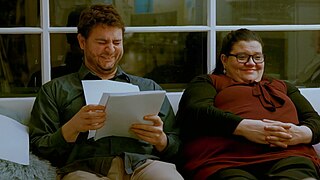
The grievance studies affair, also referred to as the "Sokal Squared" scandal, was the project of a team of three authors—Peter Boghossian, James A. Lindsay, and Helen Pluckrose—to highlight what they saw as poor scholarship and eroding criteria in several academic fields. Taking place over 2017 and 2018, their project entailed submitting bogus papers to academic journals in cultural, queer, race, gender, fat, and sexuality studies to determine if they would pass through peer review and be accepted for publication. Several of these papers were subsequently published, which the authors cited in support of their contention.
















